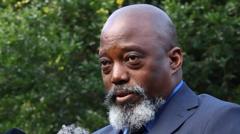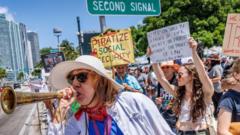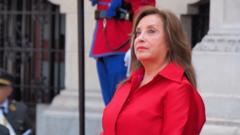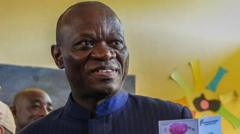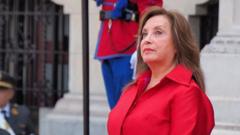South Korean President Yoon Suk Yeol issued an apology regarding his controversial martial law declaration, which has intensified political unrest and resulted in imminent impeachment proceedings. Despite acknowledging the distress his decision has caused, he chose not to resign, deferring his fate to the ruling party as lawmakers prepare to vote.**
**South Korea Faces Political Crisis as President Yoon Suk Yeol Apologizes Ahead of Impeachment Vote**

**South Korea Faces Political Crisis as President Yoon Suk Yeol Apologizes Ahead of Impeachment Vote**
**In a nationally televised address, President Yoon Suk Yeol expressed regret over his martial law declaration, leaving his fate to his party amid mounting calls for his resignation.**
President Yoon Suk Yeol of South Korea finds himself in a precarious position as he prepares for an impeachment vote scheduled for Saturday. In a brief televised address, the president extended an apology to the South Korean populace for the martial law declaration he issued earlier this week, which sparked widespread protests and has plunged the nation into political chaos.
During the address, which lasted just over two minutes, Yoon expressed profound regret, acknowledging that the martial law decree, made out of “desperation,” led to significant “anxiety and discomfort” among citizens. He refrained from resigning, despite increasing pressure from various opposition parties and even members of his own People Power Party.
“I will not dodge my legal and political responsibility for this declaration of martial law,” Yoon stated firmly, assuring the public that there would be no repeat of such a measure. He indicated that the responsibility for stabilizing governance would rest with his party, emphasizing that he would leave critical decisions about his presidency to them.
Yoon's statement comes amid a turbulent political climate, with lawmakers poised to vote on whether to move forward with impeachment proceedings that could succeed if eight members of his party join the opposition. Major opposition figures and unions are rallying support for demonstrations against him.
Following Yoon's address, Han Dong-hoon, the leader of the People Power Party, remarked that Yoon's resignation seems inevitable, asserting that it has become untenable for him to fulfill his presidential obligations. This shift in sentiment signifies mounting concern within the ruling party regarding the president’s capacity to govern effectively post-crisis.
Opposition leader Lee Jae-myung criticized Yoon's speech as insufficient, suggesting that it would only exacerbate public discontent. Lee characterized Yoon as “the greatest risk South Korea faces” and demanded either immediate resignation or impeachment.
In a further indication of political turmoil, rumors had circulated that Yoon might reimpose martial law, generating additional fear and unrest. However, in his address, he clarified that the possibility of a second declaration was off the table.
As events unfold, the National Assembly will convene at 5 p.m. on Saturday to deliberate on Yoon's fate, with demonstrators protesting in the streets. If impeached, Yoon would be suspended from office until the Constitutional Court determines the outcome of the proceedings, potentially altering the political landscape of the nation significantly.


